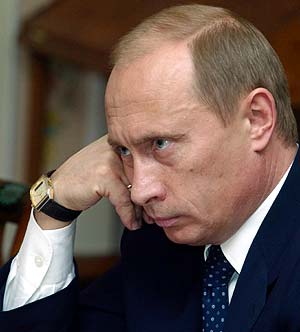
SURVEY: RUSSIA
May 20th 2004
From The Economist print edition

“THE sovereign must be autocratic,” said Catherine the Great, “for no other form of government but that which concentrates all power in his person is compatible with the dimensions of a state as great as ours...Any other form of government would be not only harmful, but utterly ruinous for Russia.”
After several centuries of autocracy and 13 years of what they were told was democracy, most Russians would side with Empress Catherine. Boris Yeltsin, hailed as Russia's first democratic leader, spent nearly a decade presiding (or rather failing to preside) over ruinous near-anarchy. Vladimir Putin, specially plucked from obscurity to be Mr Yeltsin's obedient successor, has turned out to be nothing of the kind.
Russians admire his youth, sobriety, steely restraint and love of order, and many find their own lives better and calmer. Foreign investors who ran away after the government default and economic crash in 1998 have flocked back. They extol the increasing stability of the economy, the growing power of consumers, the energy and imagination of entrepreneurs. They are convinced that the president and his economic reformers want to remove the distortions caused both by Soviet socialism and by the post-Soviet, crony-capitalist gold rush, and create a land in which the free market can flourish. They too will say, quietly, that the empress had a point.
But both Russian and western political liberals look at Russia with a tightening knot of fear in their bellies. They see an authoritarian leader who has repressed the media and free speech, planted former secret agents and soldiers throughout the government, and turned both houses of parliament into dispensers of rubber stamps; who has encouraged the resurgence of nationalism and allowed the conflict-ridden republic of Chechnya to become a morass of banditry and killing on both sides; who has shown his taste for power and distaste for business by persecuting Mikhail Khodorkovsky, Russia's richest man; and whose “reforms” are at best ineffectual and at worst a charade.
The biggest land-mass, the coldest places, the greatest riches, the cruellest rulers on earth: an extreme land provokes extreme views. But today they seem more divided than ever. Sometimes one wonders if people are talking about the same place. An article in the New Republic in February by Masha Gessen, a leading Russian-American journalist, accusing the American media of largely ignoring “the death of Russia's nascent democracy” under Mr Putin, started a furious debate on Johnson's Russia List, the online forum of the small international community of English-speaking Russia-watchers. A few weeks later an article in Foreign Affairs by two scholars, Andrei Shleifer and Daniel Treisman, provoked another row. The authors berated the press for exaggerating Mr Putin's autocratic bent, and argued that on just about any measure Russia is now “a normal country”, doing no worse than the average in the developing world.
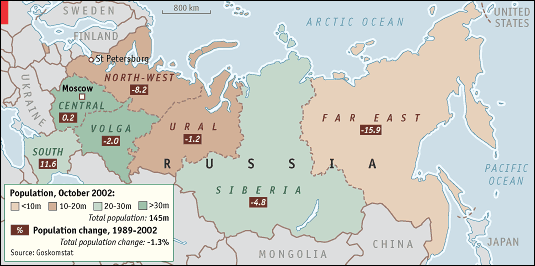
One of the things that developing countries take time to establish is a consensus about what they should be developing into. Russia has a special knack for confounding predictions. In the heady days of the early 1990s many assumed that the wave of democratic feeling that had washed away the Communists would permeate everything and that Russia, having been a Communist superpower, was well on the road to becoming a capitalist, democratic one.
But the new regime was more fragile and corruptible than anyone had imagined. It twisted the notions of capitalism and democracy out of all recognition. Under Mr Yeltsin a small cabal of magnates, the “oligarchs”, obtained much of the country's industry and natural resources on the cheap in return for supporting the president. Economic disasters repeatedly swallowed up ordinary people's savings. Political parties came and went like puffs of smoke. Not until last December's parliamentary elections, which wiped out the two small liberal parties, Yabloko and the Union of Right Forces, and filled the Duma with grey Kremlin yes-men, did it finally hit home that Russians had found their “democracy” to be as shoddy as anything they used to buy in Soviet-era shops, and were content to let it go. That bitter disappointment is one reason for the lack of consensus today.
Another reason is that Mr Putin, on whom everything in Russia is perceived to depend, also has a knack for confounding predictions. In the autumn of 1999 Mr Treisman, blissfully unaware (like everyone else) that the then prime minister would soon take over the country, argued in Foreign Policy that the next president—whoever he might be—would remain shackled by the powerful oligarchs, renegade regional governors, corrupt officials and querulous parliament that had hobbled his predecessor. “Probably about a year after he moves into the Kremlin,” Mr Treisman wrote, “Russia's next president will look in the mirror and see not himself but Boris Nikolaevich Yeltsin.”
The opposite happened. Much of what Mr Putin did in his first term was aimed at dismantling Mr Yeltsin's legacy. Just before his virtually unopposed re-election this March, he dismissed Mikhail Kasyanov, the prime minister and the last of Mr Yeltsin's (and the oligarchs') senior allies, making his own position more unassailable than ever. Facing his second and final term (unless a servile parliament changes the constitution), he has as much freedom as any post-Soviet leader will ever have to do what he wants—whatever that may be.
That has brought the question, “Who is Mr Putin?”, which raged for the first couple of years of his presidency, to the fore again. His background as a mid-level KGB agent in East Germany, followed after 1991 by a stint as deputy mayor of St Petersburg (where he was responsible for the city's foreign relations and economic development), shows in his policies: he tends to trust his fellow siloviki, men from the security services, yet he clearly understands the need for Russia to overcome the legacy of Soviet economic planning and rethink its position in the world.
Those who know him describe him as a “mirror-man”, often seeming to adopt his interlocutors' ideas and even speech, which adds to the confusion. Human-rights activists and army generals alike come away feeling that he is on their side. He keeps all the forces in his government in balance, creating endless debates about whom he favours, and indeed whether he is the puppet-master or the puppet. He is also good at shifting blame on to his officials, so he remains hugely popular even if his policies are not.
Nonetheless, over the past four years his main goal has become clearer. On the face of it, it is a simple and reasonable one. He wants Russia to be a strong country: economically powerful, politically stable and internationally respected. What is in dispute is what those goals mean to him, the methods he uses to achieve them, and whether he is as powerful as he seems.
This survey looks back at Mr Putin's first term and forward to the second. It tries to reconcile the optimistic and pessimistic views by showing that both contain much truth, and both are necessary to understand today's Russia. Economic liberalism and political illiberalism are complementary parts of Mr Putin's strategy, but his contribution to both is often exaggerated. Russia's new-found prosperity is fragile and will require deep and difficult reforms to sustain. At the same time the shrinkage of freedoms is less clear-cut than it seems, and not always the result of orders from the top.
What is clear is that an open economy and a closed political system make uneasy bedfellows. The overweening bureaucracy is harming business, and not just that of power-hungry magnates like Mr Khodorkovsky, but of the little people building the foundations of Russia's new economy. Encouragingly, business is fighting back, and citizens, increasingly deprived of a political voice at the top, are beginning to build democracy from the bottom up.
But that will take time. The past 13 years have discredited democracy for Russians. The way to avoid both disappointment and confusion is to abandon the assumptions of the 1990s, accept that Russia is on a path of its own for now, and try to understand where that path leads.
SURVEY: RUSSIA
May 20th 2004
From The Economist print edition
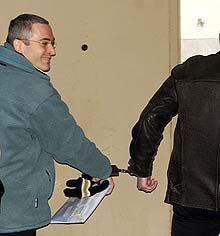 THE
tussles between the inscrutable Kremlin and a small band of obscenely rich men
are far removed from the lives of ordinary Russians. But nothing typifies the
contradictions of Mr Putin's presidency like the saga of Mikhail Khodorkovsky.
It embodies the tension between the rule of power and the rule of law,
exemplifies the opacity of Russian decision-making, and splits
opinion—especially western opinion—about Mr Putin's real motives right down the
middle.
THE
tussles between the inscrutable Kremlin and a small band of obscenely rich men
are far removed from the lives of ordinary Russians. But nothing typifies the
contradictions of Mr Putin's presidency like the saga of Mikhail Khodorkovsky.
It embodies the tension between the rule of power and the rule of law,
exemplifies the opacity of Russian decision-making, and splits
opinion—especially western opinion—about Mr Putin's real motives right down the
middle.
Like other “oligarchs”, Mr Khodorkovsky, already rich after some clever wheeling and dealing in the crumbling Soviet Union, became super-rich thanks to the pact between business and the Kremlin to ward off a Communist comeback in the 1996 presidential election. In return for supporting Boris Yeltsin, he was allowed to buy control of his oil company, Yukos, for $309m in 1995. His own bank, Menatep, ran the auction. Like his fellow magnates, he expanded his business empire by dealing ruthlessly with business partners, creditors and minority shareholders.
When Mr Putin took office, two media barons, Vladimir Gusinsky and Boris Berezovsky, realised that he might break their hold on power, and began using their national television stations to attack him. In July 2000 he called a meeting with 20 other oligarchs to set the rules: they could keep what they already had, but in future must stick to the law and stay out of politics. Soon a series of legal investigations had stripped Messrs Gusinsky and Berezovsky of their main assets (though they kept sizeable fortunes) and chased them into exile. Several others faced criminal cases too, which were later quietly dropped when they toed the line.
Mr Khodorkovsky seemed to understand the new rules. He was also the first to grasp that, with the era of asset-grabbing gone, it would pay to turn Yukos into a transparent company run the western way. Investors rewarded him. At its peak last year, his stake in Yukos was worth 106 times more than what he had paid eight years earlier.
But last July Platon Lebedev, one of Mr Khodorkovsky's closest partners, was arrested for embezzlement in the acquisition of Apatit, a fertiliser company, in the early 1990s. A wave of investigations followed, looking into everything from Yukos's tax payments to its part-privatisation to its links to unsolved murders. In October, in a dramatic dawn raid on his private jet, Mr Khodorkovsky himself was arrested. Hehas been in jail awaiting trial ever since.
For months, even the best-connected were baffled. Each scrap of information bred new theories and shook the financial markets. Had Mr Khodorkovsky broken Mr Putin's ban by openly funding political parties or pro-democracy projects through his philanthropic Open Russia Foundation? Had he annoyed the president by campaigning too hard for an end to the state pipeline monopoly, or for a pipeline from Siberia to China when the government was in talks with Japan? Did the government want to prevent Yukos from being bought by a foreign oil firm, or from buying a Russian firm, Sibneft, and becoming too big? Was it because Mr Khodorkovsky, at a public meeting with Mr Putin, had implicitly accused senior officials of corruption? Had Mr Putin himself sanctioned the attack on Yukos, or were the shadowy siloviki, his henchmen from the security services, pulling his strings? If so, would they stop there, or was it part of a wider campaign against the oligarchs and Yeltsinites? Mr Putin always insisted that the prosecutors were independent and merely looking into alleged crimes. But if they were, why not investigate every single oligarch in the country?
Since then, a sort of consensus has emerged. Though Mr Khodorkovsky's agitation against pipelines and corruption had doubtless made him enemies, probably Yukos's greatest crime, explains Chris Weafer, chief strategist at Alfa-Bank in Moscow, was to fall foul of Mr Putin's long-term plan. During his first term the president had allowed the oil firms to ride the wave of high oil prices and make huge profits, thanks to transfer pricing and offshore tax havens. This had helped kick-start the economy. He would use his second term to wean it off oil. Thus, early last year, ministers began talking of raising taxes on the natural-resources companies and closing loopholes. The extra revenues would allow them to help other businesses, for instance by lowering other taxes and investing in infrastructure.
Yukos was not the only firm to oppose the tax changes. But as Alexei Kudrin, the finance minister, told a Russian magazine, Kompania, in February, in the only admission from on high that the case was political: “Other companies' lobbyists did not behave so aggressively.” Yukos's people, he said, “came to me and talked directly about laws that didn't suit them: ‘Alexei Leonidovich, we won't let you get your decisions through the Duma, no matter what it costs us'.” They meant it. At a reading of the tax bill in June last year, even the Communists, usually no friends of the oligarchs, voted against it. That must have been the final straw. Mr Lebedev was arrested soon after.
So, Mr Kudrin said, the Yukos affair was “inevitable, not in the personal sense, but in the sense of a clarification of the rules of the game.” The new laws were bound to meet opposition; because he led it and refused to bend, Mr Khodorkovsky was the one who paid the price. After his arrest, Mr Putin told a meeting of business leaders that “the business community could also put some effort into developing a system of new social guarantees” and “help support the transformations that have now begun in the armed forces, the housing and utilities sector, health and education.”
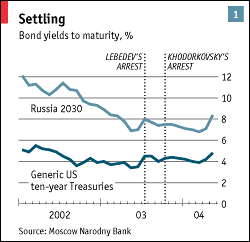
As in 2000, other oligarchs were quick to pay fealty. Earlier this year Vladimir Potanin, the head of the Interros group, demonstratively took his investment plans to the Kremlin before showing them to shareholders. Lukoil, one of Yukos's rivals, said it would voluntarily keep clear of tax loopholes, even though they were not illegal. Viktor Vekselberg of TNK-BP, another oil firm, bought a Fabergé egg collection that had belonged to Tsar Nicholas II from the Forbes family in America, calling it “a once-in-a-lifetime chance to give back to my country one of its most revered treasures.” Meanwhile, Mr Khodorkovsky sits in jail, sending out windy manifestos that nobody takes seriously. Yukos, some think, faces partial renationalisation, but the markets are as upbeat about Russia as ever (see chart 1). And there has been no more talk of private pipelines.
So all is well? Not really. The rules of the game remain hazy. There is talk of a list of 15 top businessmen who risk the same fate as Mr Khodorkovsky unless they show particular devotion. Firms are scrambling to implement whatever they think Mr Putin's idea of “social guarantees” might be: Pension schemes? Charity work? Investing where they are told to? Closing their offshore bank accounts? Firms now feature their philanthropic activities prominently on their websites.
There is no doubt that Mr Putin is in charge—for now. But it all sounds suspiciously like a re-run of July 2000, when he promised to support businesses “who act in the state's interests” and they, in turn, praised his “honesty and goodwill”. It may only be a matter of time before another magnate gets bold or foolish enough to provoke another clash. They still have clout: by one estimate, as many as 40% of the Duma's deputies are ex-employees or have other links to oligarchic firms.
These problems will arise because Mr Putin has deliberately avoided introducing something he claims to hold dear: the rule of law. When the “robber barons” who built the foundations of American industry got too powerful at the end of the 19th century, the government passed antitrust laws to break up the barons' monopolies, and enforced those laws evenly and openly. Mr Putin prefers to limit the influence of business on politics by wielding arbitrary power. That is not so surprising: laws might be weak, whereas a sword of Damocles hanging over every head is highly effective. Feudalism works. But it is also easily abused.
SURVEY: RUSSIA
May 20th 2004
From The Economist print edition
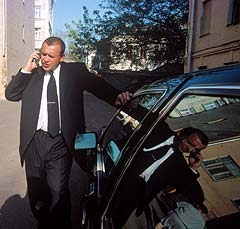 They're
out of newspapers. Shall I get a TV station instead?
They're
out of newspapers. Shall I get a TV station instead?“IT'S a typical post-revolutionary situation,” says Georgy Satarov, a former aide to Boris Yeltsin who now runs INDEM, a think-tank. “Attempts to strengthen the state, using the rubble of the previous state. After the French revolution overthrew the aristocracy, Napoleon created a new aristocracy. The same thing is happening here.”
By “aristocracy”, though, Mr Satarov does not mean the oligarchs. He is talking of the new elite: the siloviki, loosely translatable as “power people”, to whom Russians refer by tapping an imaginary epaulette on their shoulders; the men from whose ranks Mr Putin comes.
The siloviki infest the nightmares of those who fear that Russia is returning to authoritarianism. Like horror-film zombies, they seem to proliferate. According to Olga Kryshtanovskaya, a sociologist at the Centre for the Study of the Elites at the Russian Academy of Sciences, people with a military, intelligence or law-enforcement background make up around three-quarters of Mr Putin's top officials, as against just 5% of Mikhail Gorbachev's Politburo. They occupy more than a third of the posts in the top three levels of government, and make up 70% of the staff of Mr Putin's seven federal envoys or “super-governors”. Mrs Kryshtanovskaya classifies Mikhail Fradkov, the new prime minister, as a “hidden silovik”: there are tell-tale hints of some KGB training in his youth (a brief gap in his biography, an early diplomatic post), and he was a protégé of Sergei Ivanov, Mr Putin's defence minister.
As a group, Mrs Kryshtanovskaya says, siloviki are “the part of society that lost out the most from democratisation. They were privileged in Soviet times, they were above the law...They want a return to ‘fairness', which in their eyes means a strong state that gives them these privileges.” Leading siloviki have their own powerful business ties, including to state-owned arms and oil firms.
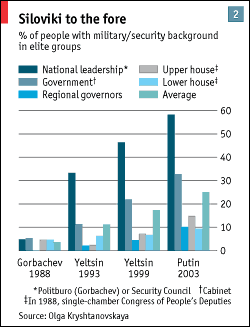
Yet to raise the alarm about the siloviki themselves partly misses the point. First, they are not a united group with common goals. In the old days, those in foreign intelligence considered themselves an elite and felt “contempt for what they saw as the idiots who ran internal security,” says a senior western diplomat. (Mr Putin, who served in the KGB in East Germany, straddled the two.) Thanks to their contact with the West, they were often the most sophisticated members of the Soviet nomenklatura. Second, it was Mr Yeltsin, not Mr Putin, who began appointing siloviki at all levels (see chart 2), perhaps because they were often more disciplined and professional than other bureaucrats.
Third, last year's scare of a silovik-led takeover of power owes a great deal to Yukos. When the company faced the Kremlin's wrath, it tried to win support, especially in the West, by circulating scary tales about its run-in with two of Mr Putin's silovik sidekicks, Victor Ivanov and Igor Sechin. But it is now clear that the oil company had annoyed the president and his economic team every bit as much.
And fourth, though he has put siloviki in charge of some of the important ministries—such as defence and internal affairs—Mr Putin has kept economic policy under the control of liberal economists. In the cabinet reshuffle he went one further by replacing the six deputy prime ministers of old with a single one, Alexander Zhukov, a respected economist, who is to oversee reform. Cabinet purges have been aimed at those loyal to the oligarchs, rather than specifically those who oppose the siloviki. Mr Fradkov seems to have been picked not so much for his possible KGB ties as for his obedience, efficiency and—allowing that Mr Putin wants Russia to become a member of the World Trade Organisation—long experience of foreign-trade issues. Even in his presidential administration, Mr Putin has kept counterweights to Messrs Ivanov and Sechin.
There are real concerns about the siloviki, though. One is that in their strongholds, they are now as powerful and unaccountable as in Soviet days. Historical researchers complain that access to KGB and Communist Party archives is closing up again. Meddlesome journalists and newspapers can expect raids, and worse, from the FSB, the KGB's successor. The threat of terrorism is used to justify everything from more document checks on the street to trials being held in camera.
More sinister still, there has never been a public explanation of how a large band of Chechen terrorists managed to take control of Moscow's Dubrovka theatre in October 2002, nor for the deaths of at least 120 hostages—some think many more—after special forces gassed and then stormed the building. The Duma commission investigating claims of FSB involvement in a series of apartment-block bombings in 1999, which were officially blamed on Chechen terrorists, has suffered a suspicious number of misfortunes. Last year one of its members was murdered, a second died mysteriously of food poisoning, and a third was severely beaten up. Mikhail Trepashkin, an ex-FSB agent and lawyer representing two of the bombings' victims, who was planning to voice his own suspicions about the FSB's role at the bombers' trial last autumn, was jailed a week before the trial started.
What is also worrying many people is that the whole federal apparatus has become bigger and more intrusive. Mr Yeltsin had told the 89 regional governors to “take all the power they could”. That led to chaos. Mr Putin appointed inspectors to each region and grouped them into seven federal districts, where his envoys have helped redraft a large number of regional laws that contradicted federal ones, and sorted out jurisdictions.
Most other law-enforcement agencies have opened regional offices too. Regional police chiefs and prosecutors, who used to be appointed and promoted locally and were often in corrupt cahoots with local bosses, are now appointed by the central government and rotated from one region to the next. According to Nikolai Petrov at the Carnegie Centre in Moscow, three-quarters of them have been replaced or moved since Mr Putin took office.
The presidential administration has also opened over 2,000 “public bureaus” for citizens to file complaints or seek advice. The administration itself has swelled almost into a parallel government, like the Central Committee of the old Communist Party; a recent “cut” after the cabinet reshuffle turned out to be largely cosmetic.
Some order after the chaos of the Yeltsin years was certainly needed. But the new structures, says Mr Petrov, do more: they form an extensive intelligence-gathering network, which comes into its own at critical times such as elections. The public bureaus, which local businesses are invited to fund as part of their “philanthropic spending”, collect information at the grassroots level, and the federal-district offices keep a close watch on the local bureaucracy. And although the regional law-enforcement bosses may no longer serve local masters, “that does not necessarily reduce corruption,” says Mr Petrov. “It simply redirects it.”
Thus, he says, Mr Putin's weakening of democracy “is not a plan, but a logic: it's a side-effect of the strengthening of the federal centre.” But side-effects sometimes take centre stage. In several instances, the Kremlin has blocked governors' re-election or installed its own appointees. In October Mr Putin, blithely ignoring a law that bans senior officials from electioneering, openly supported Valentina Matvienko, his chosen candidate for the governorship of St Petersburg. She won, but nearly three-quarters of the voters showed their disgust by staying away.
Some of the heaviest criticism of Mr Putin concerns press freedom. Mr Gusinsky's and Mr Berezovsky's television networks, NTV and ORT, were the first to be taken over. NTV itself, under its new government-appointed manager, Boris Jordan, was still relatively independent. But late in 2002 it came under fire for imperilling the Dubrovka hostage rescue. The networks had promised to get clearance before airing footage of special forces storming the theatre in order to keep the terrorists in the dark. NTV had supposedly broken the promise. Mr Jordan insisted that its pictures went out only after the rescue ended, but was ousted soon after.
But the real picture is rarely clear-cut. The journalists at NTV and ORT are under state orders now, but they were hardly “free” under their old bosses, who had used their channels to engineer Mr Yeltsin's 1996 election victory and later to attack Mr Putin. Mr Jordan's departure, some at NTV think, may be mostly due to his refusal to sign a deal with Video International, a powerful advertising company formerly run by Mikhail Lesin, who later became press minister.
Moreover, smaller media outlets are thriving, even if owned by oligarchs. Mr Khodorkovsky may lose Yukos, but he still controls TV2 in Tomsk, one of the best and most independent—not least of its owner—regional stations. He also bought and revived a former dissident newspaper, Moskovskie Novosti, putting Yevgeny Kiselyov, the original editorial chief at NTV, in charge of it. Mikhail Fridman's Alfa-Group has a stake in a national entertainment channel, STS. Mr Berezovsky controls the feisty Kommersant, a leading Moscow business daily, and three other papers often critical of the government.
On the other hand, Vladimir Potanin's papers, Izvestia and Komsomolskaya Pravda, have bigger readerships and are much more loyal to the Kremlin. “There is freedom of speech,” says Rustam Arifdzhanov, who has just started up his own media group catering for ethnic minorities, “as long as it's not a threat to the authorities. Russia will have just as much freedom of speech as it needs.”
But who decides how much it needs? As in his dealings with the oligarchs, Mr Putin prefers wielding arbitrary power over the media to having clear laws. Clearly he distrusts media owners. He may tolerate some press freedom now, but no one knows for how long.
“He sees the media as an instrument,” says Alexei Venediktov, editor-in-chief of the fiercely independent Ekho Moskvy radio station, who has often discussed the media with Mr Putin and those around him. “In 2000, he met with all the chief editors and told us, ‘You ought to help me. These reforms are unpopular and hard ...After that you can do what you want, but for now you're working for the good of Russia.' I said to him, ‘Our job isn't to help or not, it's to report!' He said that wasn't enough.” Mr Venediktov thinks his station, which is majority-owned by the state firm Gazprom but has a charter guaranteeing its independence, will be fine as long as things go well and Mr Putin is popular. “Where else am I going to hear the news?” one minister is said to have demanded. But if the honeymoon ends and Ekho Moskvy becomes the echo of public discontent, the station may find itself in trouble.
Lacking a real lobby, the press is vulnerable to legal attacks. One such was a law, drafted before the Dubrovka hostage crisis and rammed through the Duma after it, that clamps down on reporting in “emergency situations”. Most free countries have such laws, but in Russia the authorities have enormous discretion over what counts as an emergency. A second was a law passed last year that banned the media from publishing comments on candidates for election. It was overturned by the constitutional court soon afterwards, but by that time, says Mr Venediktov, the law had already been used to launch cases against 17 regional media outlets.
The other thing that makes the press vulnerable is the small size of the advertising market. Video International's dominance therefore gives it great power, as TV stations have found to their cost. Paid-for articles are common (a full-page story in a leading Moscow daily commands $20,000, according to one advertising-agency manager).
In the regions things are even worse: many publications are loss-making arms of other businesses whose owners may use them for their own ends. If the governor does not like what a paper prints, he may order a wave of tax inspections on its owner's shops or make life hard for it at the regional press that still prints most local publications. Local journalists who investigate corruption are sometimes murdered with impunity.
The Samara region, an industrial hub on the banks of the Volga, has over 500 registered media, says Andrei Gavriushenko, the co-editor of Delo, a business magazine. Yet even there, in one of the most prosperous regions outside Moscow and St Petersburg, the company that owns Delo and a handful of sister publications is one of only three publishing houses not owned by another business. “All our ‘independent' Russian media are very dependent,” Mr Gavriushenko smiles.
Now journalists are worried about a new press law on which an “industrial committee”, made up mostly of media owners, has been working since the Dubrovka crisis. Mr Venediktov, who sits on the committee, says the law defines the press's responsibilities to its owners but says nothing about its responsibilities to the public—another way of making it “just an instrument.”
Passing bad laws, or good laws with bad details, or good laws that are badly implemented, are all risks of Mr Putin's system. The intentions may be excellent, but what of the results? This matters most when it comes to his main project: making Russians better off.